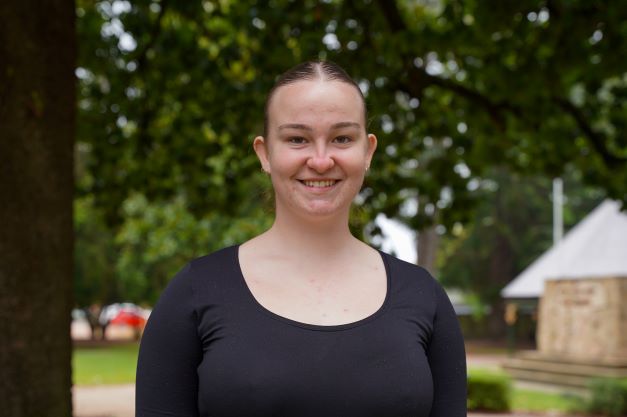CW: discussion of bushfires and natural disaster
I am so honoured to be on this project. It’s really giving back to rural communities.
–Ella Cheeseman
For Ella Cheeseman (she/her), bushfires have been a regular part of her life growing up in Rutherglen in north-east Victoria.
The 20-year-old is no stranger to disaster preparation and recalls her father fighting many prominent fires across the state with the Country Fire Authority.
“I have grown up knowing once there’s a total fire ban or in the summer when there’s bushfires around, making sure the blankets are wet, and that the gutters are cleaned, and that the sheep troughs are always full,” she said.
Motivated by her passion for climate justice and an appetite for learning new skills, she is now a peer worker with the ‘Future Proof: Young People, Disaster Recovery and (Re)building Communities’ project led by YACVic Rural.
Funded by the Commonwealth Government, the project brings together 12 organisations to empower young people to lead bushfire recovery initiatives in fire-affected communities across eastern Victoria.

Ella will be coordinating a youth advisory council consisting of 10-15 young people who live in Rutherglen and surrounding towns. The group will be running events on emergency management and undertaking tertiary courses in disaster resilience.
Ella said she is most excited about the project’s potential to address critical resource shortages in regional towns.
“Young people are just tossed to the side. We don’t get the chance to know what’s going on. We don’t get the chance to help or do anything,” she said.
“It focusses on upskilling young people and improving The people in a system. For example, teachers in a school.human infrastructure in small communities.”
There are 12 months left of the project. Ella said this is a valuable opportunity for young people to gain real world learning and make a tangible difference in their communities.
With hotter and drier summers on the horizon, regional Victoria will need to prepare for more frequent and more intense disasters.
Dr Lara Werbeloff (she/her), the Program Director of Monash University’s Fire to Flourish, said that bushfire-affected communities were often faced with a “picture of cascading disaster” involving multiple crises.
“Communities don’t really have the time to recover from one [disaster] before they’re having to immediately deal with a disaster of another kind,” she said.
Dr Werbeloff said the ramifications of climate disasters were wide ranging, from job and income losses, to property damage and mental health.
“Particularly coming out of the fires, then two years in isolation during COVID, interspersed between really significant extreme flooding in amongst all of that, the trauma arising from disasters really can’t be underestimated,” she said.

The enormous social, environmental, and economic cost of natural disasters is apparent, with one report commissioned by the Australian Business Roundtable for Disaster Resilience & Safer Communities estimating the cost of natural disasters to be $73 billion by 2060.
Dr Briony Towers, the Founder and Codirector of Learning Ecologies for Action on Disaster Risk Reduction & Resilience, believes educating and empowering young people in bushfire resilience will be a key part of the solution.
“Children and young people have really important contributions to make. They notice things that adults overlook all the time,” the former RMIT researcher said.
Dr Towers said there was a misconception that adults would always have the capacity to be responsible for emergency management.
“The realities of everyday life mean that for a whole range of reasons, children and young people may not have an adult that can keep them safe,” she said.
“Our job now is to make sure that we’re creating space for young people to participate in discussions in policy making and decision making.”

With Futureproof well underway, Ella is excited about having a seat at the table and opportunities for her peers to shape a more sustainable future.
“I am so honoured to be on this project. It’s really giving back to rural communities,” she said.



